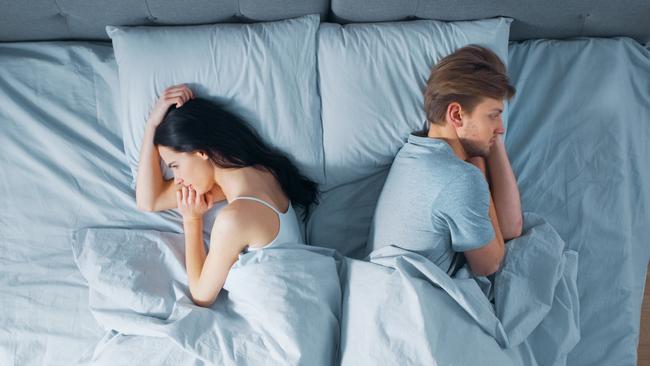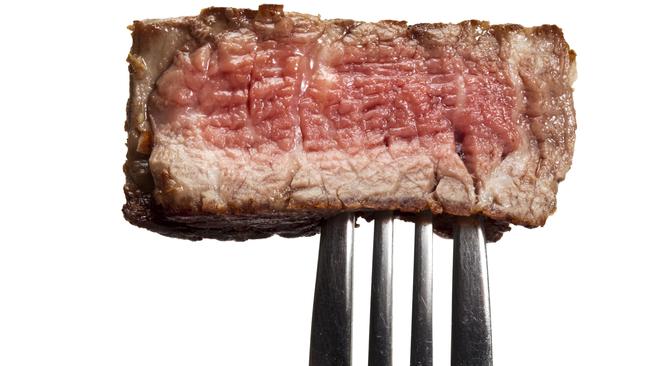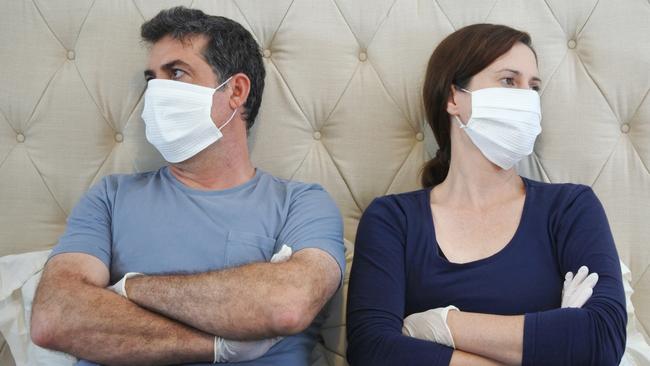What happens if you give up exercise, alcohol, meat or sex for a week?
Changing a habit for just a few days can have a dramatic effect on your health.

A week without exercise — what it does to your body
Even a few days without exercise can have a significant effect on your health. Researchers from the University of Padova in Italy recently warned that “just two days of inactivity” is enough to cause muscle wastage if you are usually active.
A team from the University of Sao Paulo in Brazil recently reported that five to 10 days of inactivity can result in significant shrinking of muscle mass. They found that healthy adults who cut their daily step count by 75 per cent to about 1500 steps a day lost 4 per cent of muscle mass in their legs in two weeks.
The older you get, the more significant these losses become. “After the age of about 35 we lose muscle mass through ageing, but the more activity you do, the slower the rate of those losses,” says Sammy Margo, a physiotherapist and personal trainer.
“If you stop exercising, you will notice the difference in your muscle tone and mass quite quickly over the age of 40.”

Physical activity stimulates the production of mood-raising hormones such as endorphins and lowers stress hormones such as cortisol, with an immediate and cumulative effect. Researchers who analysed the exercise habits and symptoms of depression and anxiety in 33,908 Norwegian adults over 11 years found that 12 per cent of cases of depression were among those who did no physical activity.
Watch out for weight gain too. “If you don’t use up the calories you are consuming, you will almost certainly put on weight,” the personal trainer Harry Jameson says.
“You would need to reduce the amount you are eating and drinking to prevent negative changes on the scales.”
Studies at the University of Liverpool have shown that cardio-respiratory fitness — the efficiency with which oxygen is supplied to muscles during activity — and mitochondrial function, the energy production of our cells, which is important for muscle and metabolic health, plummet among older adults who don’t exercise for a couple of weeks.
How to get your fitness back
Margo warns that muscle mass is “far easier to lose than it is to get back, particularly as you get older”, so it’s important to resume some simple strength-boosting activity — eg step-ups, push-ups, star jumps — as soon as you can. Every little helps your fitness to return.
Adding just 10 minutes of low-intensity exercise to your day, such as walking, was linked to better health and a longer life in a study of 88,140 US adults published in the British Journal of Sports Medicine, while the Norwegian team suggested that adding one hour of physical activity a week to someone’s routine could “significantly protect against depression”.

A week without getting seven to eight hours’ sleep a night
We all know that even a single night of disrupted sleep can affect mood and alertness.
“Just 18 hours without sleep is comparable to having blood alcohol levels of 0.1 per cent,” says David Ray, a professor of endocrinology at the University of Oxford.
“Since a blood alcohol content of 0.08 per cent counts as legally intoxicated in the US, it gives an indication of how much slower your reaction times and potential for making mistakes will be.”
A week of fewer sleep hours can seriously impact your health, according to sleep scientists at the University of Surrey. They found volunteers subjected to a week of no more than six hours’ sleep a night experienced disruption to hundreds of the body’s genes, including those associated with metabolism, immunity and the body’s circadian rhythm.
Richard Kirwan, a researcher in the school of biological and environmental sciences at Liverpool John Moores University, says sleep disruption leads to raised levels of cortisol, the stress hormone, which affects the body’s ability to build and repair muscle.
“This could have a significant effect on muscle mass and strength over time,” he says.
Dr Nicola Barclay, a lecturer in sleep medicine at the University of Oxford’s Sleep and Circadian Neuroscience Institute, says we eat more (and of the wrong foods) when we are tired, and since “sleep regulates the way we react to stress, disrupted sleep alters chemicals in the brain that affect our emotions and ability to cope”, even after a few nights.
How to reset your sleep cycle
In the long-term, sleep loss is associated with a raised risk of obesity as well as raised blood pressure and cardiovascular disease, so it’s important to re-establish a healthy sleep routine as quickly as you can, Barclay says. “Try not to catch up on sleep by having a lie-in or napping in the day, as that disturbs your body clock,” she says. “We can realistically achieve a 15-minute change in our body clock schedules each day, so don’t aim for massive adjustments in bedtime; maybe just aim to go to bed 15 minutes or so earlier to get back into a better routine.” Keep your bedroom cool and dark and avoid working there if you can.

A week without drinking alcohol
According to Alcohol Change UK, the charity behind Dry January, cutting out booze can improve your skin, energy levels and health in as little as a week if you usually drink several times a week or daily.
When you first stop drinking, you might miss the soporific effect of a nightcap at bedtime, but rather than helping you to sleep, alcohol interferes with the quality of your rest, suppressing REM (rapid eye movement) sleep, which is when we dream, and can leave you feeling exhausted. A few days without drinking and you’ll notice a difference.
“By days four to seven your body’s systems are back to their usual working levels and you may find that you have more energy and better concentration,” says Lauren Booker, an adviser to Alcohol Change UK.
You could also lose weight. Lucy Holmes, the director of research and policy at Alcohol Change UK, says: “Alcohol contains little in terms of nutritional value, but contributes a lot of excess calories.”
It can also lead you to snack more than you should, so it’s easy to pile on the pounds without realising it. Alcohol can also dehydrate your skin, making problems such as rosacea and eczema more likely if you are vulnerable to them, and is thought to have an effect on hormones, which might make spots and acne worse.
The best way to cut down
If cutting out alcohol completely feels too much, especially during lockdown, try to cut down. A high alcohol intake (more than 14 units a week on a regular basis) is associated with a higher risk of obesity, type 2 diabetes, heart disease and cancer. The Drink Free Days campaign launched jointly by Public Health England and Drinkaware, an alcohol education charity, recommends middle-aged drinkers aim for several alcohol-free days a week, aiming for a minimum of two to three days.

A week without eating red meat
Giving up red meat for a week could give your health a real boost. According to NHS guidelines, we should be eating “no more than 70g of red and processed meat a day”. A slice of ham or rasher of bacon weighs about 20g, while a thick slice of roast beef or lamb chop is about 50g, so it’s quite easy to reach your limit — and even that might be too much.
Last year a study at the University of Oxford’s cancer epidemiology unit published in the International Journal of Epidemiology suggested that bowel cancer risk begins to increase if someone eats more than 25g of red meat a day. In addition, according to the British Heart Foundation, “meat is a major source of saturated fat, and too much saturated fat is linked to increased bad cholesterol, which is a risk factor for heart and circulatory disease”.
So if you usually eat a lot of meat and meat products, your intake of saturated fat, preservatives such as potassium nitrate, which are linked to bowel cancer, and salt, linked to raised blood pressure, could plummet after a week of avoiding them, “provided you don’t replace them with equally salty and high-fat foods”, says dietician Frankie Phillips.
How to cut back healthily
If you replace meat with more vegetables and pulses you will find that, even seven days in, your “digestion improves and your bowel movements are healthy and more regular” as a result of an increased fibre intake, Phillips says.
“Try for 30g of fibre daily to boost your gut health and the diversity of your microbiome, which brings more health benefits.”
Red meat is a valuable source of haem iron, the type most easily absorbed by the body, so if you continue cutting it out for longer than a week, you will need to get iron from other sources. It can be found in dark, leafy green vegetables, kidney beans and chickpeas.
“Meat is a complete protein source, meaning it provides all essential amino acids needed by the body to produce muscle and other tissue, hormones, neurotransmitters and the cells and antibodies that boost the immune system,” Phillips says.
“But fish and dairy are other protein sources, and we now know that complete protein exists in the plant world and that soya, quinoa and Quorn provide the protein you would normally get from meat.”

A week without sex
“Disruption to normal sex patterns can cause one or both of a couple to become concerned or even stressed,” says Jo Coker, a psychologist and counsellor who is spokeswoman for the College of Sexual and Relationship Therapy. “A week is nothing to worry about as longer-term sexual relationships tend to go through different waves, but if you are usually very sexually active and tactile and that stops for longer periods, it could lead to frustration and anxiety.”
There are also physical side-effects associated with a lack of intimacy, and not just that pelvic floor muscles remain underused. “Sex, human touch and connection all stimulate our neurological systems to release hormones, like oxytocin and endorphins, which improve our mood and stress levels,” Coker says.
A 2016 review found, for older adults, regular sex can improve cardiovascular health, “reducing risks of hypertension” in women. Having sex several times a week was associated with higher levels of immunoglobulin A, an antibody that fights infection, according to one study. And it helps you to get to sleep. People who had orgasms — either from sex or masturbation - report better-quality sleep, according to researchers from Central Queensland University.
How to get the intimacy back
A week without sex is nothing to worry about, but if you usually get more, don’t let the lack of activity drift. “Make a conscious effort to be more intimate and to touch or cuddle your partner, even if you don’t have intercourse,” Coker says. “Sex is very rarely spontaneous, so plan a night when you dress up and look good for one another instead of slobbing around in tracksuit bottoms as we have all been doing.”

A week without getting outside
We all now know how much being stuck indoors can affect your mood and mental health. In a study conducted in lockdown 1, researchers found 60 per cent of adults felt depressed and 46 per cent were more irritable when spending all of their time at home. A lack of exposure to daylight — however grey it seems outside — can seriously disrupt your body clock, ultimately affecting how well you eat, sleep and work. “Natural light is essential for keeping our circadian rhythms on track,” Ray says. “Even one day of not experiencing it can affect your body clock.”
Your physical and mental energy is also affected. “Getting outside can help to heighten your focus and reduce stress levels in the body and brain,” says Dr Jennifer Wild, a consultant clinical psychologist and associate professor at the University of Oxford who is the author of Be Extraordinary (Robinson). “Your heart rate will slow down and, if you can walk in woodland or greenery, then lower levels of inflammation-inducing stress hormones course through your body, which helps to heighten your immunity.”
Try 10 minutes of fresh air a day
You don’t need to spend hours outside to make a difference. Start small. “My advice would be to get out for 10 minutes first thing every morning,” Ray says. “Your circadian rhythm will respond positively to that daylight.”
Researchers at the University of Michigan found that people asked to spend 10 minutes or more at least three times a week walking in parks, woodland or urban open spaces had significantly lower levels of the stress hormone cortisol.
Regular exposure to green space has also been shown to produce “diverse and significant” health benefits, including a drop in the risk of type 2 diabetes in another study.

A week without taking regular screen breaks
In the course of a week we’ll spend hours glued to laptops, smartphones and TVs, so screen breaks are vital. A survey of 2000 people by the College of Optometrists in London revealed that one Briton in five thinks their eyesight has deteriorated since the pandemic started, with nearly one third of those questioned (32 per cent) believing that too much screen time was to blame for symptoms including blurred vision, red and painful eyes, or a difficulty focusing.
David Cartwright, an optometrist and the chairman of the charity Eye Health UK, says that, while there is little evidence that screen use directly damages the eyes, staring at them can cause eye fatigue and headaches.
“Our eyes are not designed to focus intently on anything for long periods,” he says.
Laptops and computers are the worst offenders. “At least with a smartphone or tablet we tend to move them around as we use them, putting less pressure on eye muscles,” Cartwright says. “But with a computer screen we tend to focus straight ahead, which is tiring for the eye muscles.”
And it’s not just your eyes that benefit from screen breaks. Last year a study from the Netherlands reported that after a week of screen abstinence in the evenings, a group of teenagers reported improved sleep, energy levels, concentration and mood.
Try the 20-20-20 rule
There’s no hard-and-fast rule about the number of hours that we should or shouldn’t be staring at screens, but taking breaks is important. Optometrists advise practising the 20-20-20 rule — that means looking up every 20 minutes to look at something else 20ft away (6m) for at least 20 seconds.
“By looking away from a screen and at something else in the distance you will relax the focusing muscles of your eyes, which in turn reduces eye fatigue and strain,” says Giles Edmonds, an optometrist and the clinical services director for Specsavers.
Cartwright suggests positioning a computer screen slightly below eye level if possible. “The muscles of the eye are more comfortable when you look slightly downwards, so this is less likely to cause eye strain than if you are staring up or straight ahead,” he says.
The Times







To join the conversation, please log in. Don't have an account? Register
Join the conversation, you are commenting as Logout